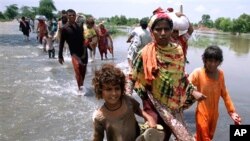International aid agencies said Friday they are accelerating their response to the catastrophic emergency situation in Pakistan, but warned the scale of the devastation wrought by the flooding is staggering.
Latest figures estimate 14 million people are affected by the floods, more than 700,000 homes are damaged and destroyed and at least 1600 people have died from the flooding. And the scale of the disaster continues to worsen, said the International Red Cross and Red Crescent Movement.
Jacques de Maio, who heads operations for South Asia for the International Committee of the Red Cross, said the full magnitude, scope and nature of the catastrophe is not yet known.
Millions of people need food, clean water and medical care, he said, and they need it right now.
"There is indeed a very serious and shared risk assessed by the different humanitarian agencies working in Pakistan that there might be a second wave of deaths induced by the floods under the shape of water-borne diseases, diarrhea-related problems," he said. "And, this is something that needs to be addressed from the very onset of the humanitarian response."
As much as 50 percent of the country has been inundated, causing widespread loss of crops. In some areas, 80 percent of farm livestock reportedly has been lost.
De Maio said millions of people have seen their livelihoods literally wash away. Restoring them is critical to any early recovery plan. So far, he said the Pakistan Red Crescent and the ICRC has provided 100,000 victims with food, shelter, hygiene kits and other items during the first week of the floods. The two organizations aim to increase the number of beneficiaries to around 350,000 in the coming days, said De Maio.
Given the enormity of the needs, he said it is clear millions of people will not get the assistance they need, adding that international efforts cannot keep pace with the scope of the emergency. But, the ICRC will continue to do what it can.
"A total of 150 trucks have been hired and we are recruiting armies of donkeys to be able to reach the people who are so far not accessible. This is with regard to food and non-food aid. A very important, equally important aspect is about water and health," De Maio said. "The idea is to prevent disease, to boost local capacity to deal with epidemics."
Water engineers are installing water purification systems and water treatment plants and that, said De Maio, will help prevent people from getting ill.
But more mobile health clinics also are urgently needed to treat people in the field. Restoring family links is another very important task, he said. To that end, De Maio said the Pakistan Red Crescent and ICRC tracing services are working to reunite family members who have been separated by the flooding.




